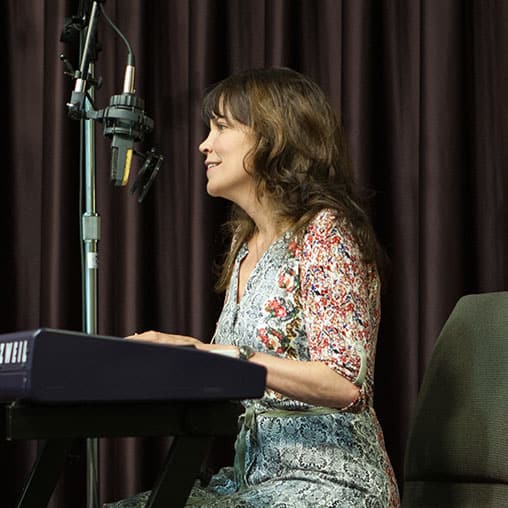
An Open Door
What do you want to do with your life? For today's guest, Ginny Owens, the answer is simple-to sing and write songs. But had you asked her in college about her career plans, Ginny would have suggested something more practical, like teaching. Ginny talks about the ups and downs of college, and the closed doors that eventually redirected her to a thriving music career.
Show Notes
About the Host
About the Guest
-
What do you want to do with your life? For today's guest, Ginny Owens, the answer is simple-to sing and write songs. But had you asked her in college about her career plans, Ginny would have suggested something more practical, like teaching. Ginny talks about the ups and downs of college, and the closed doors that eventually redirected her to a thriving music career.
-
Dave and Ann Wilson
Dave and Ann Wilson are hosts of FamilyLife Today®, FamilyLife’s nationally-syndicated radio program. Dave and Ann have been married for more than 38 years and have spent the last 33 teaching and mentoring couples and parents across the country. They have been featured speakers at FamilyLife’s Weekend to Remember® marriage getaway since 1993 and have also hosted their own marriage conferences across the country. Cofounders of Kensington Church—a national, multicampus church that hosts more than 14,000 visitors every weekend—the Wilsons are the creative force behind DVD teaching series Rock Your Marriage and The Survival Guide To Parenting, as well as authors of the recently released book Vertical Marriage (Zondervan, 2019). Dave is a graduate of the International School of Theology, where he received a Master of Divinity degree. A Ball State University Hall of Fame quarterback, Dave served the Detroit Lions as chaplain for 33 years. Ann attended the University of Kentucky. She has been active alongside Dave in ministry as a speaker, writer, small-group leader, and mentor to countless wives of professional athletes. The Wilsons live in the Detroit area. They have three grown sons, CJ, Austin, and Cody, three daughters-in-law, and a growing number of grandchildren.
-

Ginny Owens
A three-time Dove Award winner, Ginny Owens became a household name when she was named Gospel Music Association’s New Artist of the Year in 2000. In a career that has spanned fifteen years, Ginny’s seven studio recordings have amassed nearly one million records in sales and spawned career-defining number ones like “If You Want Me To” and “Free.” Her songwriting prowess has earned her song cuts by artist peers like Rachael Lampa and Christian music leg...more
What do you want to do with your life? For Ginny Owens, the answer is simple-to sing and write songs. Ginny talks about the ups and downs and the closed doors that led her to a thriving music career.
Bob: As a young woman, who became blind as a child, Ginny Owens has faced adversity and uncertainty throughout her life. In the process, she’s learned that her hope is found in a God who can be trusted.
Ginny: You know, I would encourage those who feel like they’re facing a circumstance that they just go: “I don’t know how God is in control of this. I don’t know how He’s allowed it to happen,”—I would definitely encourage you to wrestle that out—you know, wrestle it out with Scripture, wrestle it out in prayer, wrestle it out with friends and family, who can offer insight, because I do find that it’s when we wrestle through those things that God reveals Himself.
Bob: This is FamilyLife Today for Tuesday, November 24th. Our host is the President of FamilyLife®, Dennis Rainey, and I’m Bob Lepine. Ginny Owens joins us today to share about her life, share her music, and to share her confidence in a great God.
1:00
Stay tuned.
And welcome to FamilyLife Today. Thanks for joining us on the Tuesday edition. The issue of God’s sovereignty is one of those issues we do wrestle with when we face circumstances, events, actions—things that happen in our lives—where we go, “That wouldn’t be what I would have picked.” And yet, we do have to acknowledge that God knows better than we know in the midst of our circumstances.
Dennis: Yes. Bob, I’ve been reminded of that afresh. I’ve been spending a lot of time in the Gospels, just been reading about the life of Christ. I’m amazed that Jesus asked so many questions. If there was ever anybody who ever walked on the planet, who ought to be making statements, it would be Jesus; but instead, He asks a lot of questions.
He also touched a lot of lives. One of the lives he touched is in John, Chapter 9,
[verses 1-41]—it was a man who was born blind.
2:00
Jesus stepped into his life and healed him. The religious community couldn’t believe it. Of course, they made a big deal out of it. Jesus said: “It wasn’t because of his sin or somebody else’s. It was so the glory of God could be demonstrated in this man’s life.”
Bob: You went right to that passage when we had the opportunity recently to sit down and talk with Ginny Owens, who’s a singer/songwriter, who has been blind from her early childhood. She came and shared with us and with our staff some of her songs and a lot of her story.
We thought: “You know what? Thanksgiving week is a pretty good week to revisit and give thanks for the blessings that we have—some of which we take for granted in our lives—things like eyesight, or shelter, or food, or just the gift of life that we have each day.” We thought our listeners would be encouraged by Ginny’s story.
3:00
Dennis: Bob, you know her story; but she’s received three Dove awards, including the New Artist of the Year in the year 2000. She had the inspirational recorded song of the year in 2001 for the song, Blessed.
She has her own non-profit organization called Fingerprint Initiative—so she’s leaving her fingerprint on the soul of people’s lives through the gift of music and through the story of her own life. You’re going to be encouraged by her life. If you know a young person, who’s talented and maybe struggles with some limitations they are facing—might ought to pick up a phone, call them, and tell them to listen to this broadcast.
Bob: We’re going to pick Ginny’s story up as she heads off to college in Nashville.
[Previously Recorded Interview]
Bob: So let’s go to Belmont. When you got accepted into Belmont, it was in the music program; right?
Ginny: It was—because God has a sense of humor—so, yes.
Bob: So you were studying, thinking that you would probably be a music teacher at some point—
4:00
—is that kind of the career path you were on as you studied music?—or were you thinking songwriter again? —or “Maybe I’ll be the next Amy Grant,”—or what were you thinking?
Ginny: I vaguely remember hoping to still major also in psychology; but by the end of my freshman year, I was all into music. I thought maybe I would be the cool music teacher—maybe go teach high school and direct a choral program, and teach students how to come up with their own background vocals, and maybe teach them how to read charts as well as reading classical music—so almost introduce contemporary music to them as well.
Dennis: So you’re on a track to use your musical talents again. This is kind of a resurrection of sorts. One of your professors made a flippant comment in front of your peers about your talent.
5:00
Ginny: I was in an audition with one of my friends. I was playing piano for her, accompanying her as she sang. Our professor remarked: “Yes, Ginny—your voice is really weak. I was thinking, in your audition yesterday, it’s just so weak. I’m not sure what you’re ever going to be able to do with it.” I had to recover, and smile, and play / accompany my friend.
Then I had to think about my life and what to do with that comment. It inspired me, actually; and I finished my music education degree. The great part of making that choice was that I spent my last semester of classes in—I don’t know—21 hours of general eds because, as a music major, you put off your general eds for a long time. The great part was that I had so much time to write songs in those classes. [Laughter] So I wrote—really, my first record was pretty much written in those classes. [Laughter]
Bob: When you graduated, having been kind of steered away from performance by a professor, now you’re thinking, “Music education is what I’ll do.” But you found that schools were reluctant to hire a blind music teacher.
6:00
Ginny: They definitely were. They seemed so excited when they got my resume and when we’d talk on the phone to schedule the interview. I would walk into the room, and you could just sense them freaking out and becoming unnerved. It was a blow, but I expected it would be that way.
I don’t know—about six months in, I was very frustrated. I was just going: “Okay Lord, I don’t have any idea why I’m here. I don’t know why You’ve brought me to this place. Did I major in the wrong thing? Did I go to the wrong school? What am I supposed to be doing right now?” Unfortunately, questions seemed to come in packages of many instead of just one at a time—I had plenty of them.
It was at that time, though, that I really began to learn what it is to trust and to surrender because I knew that I literally didn’t know what was around the corner or what was right in front of me.
7:00
I think that was a huge development in my relationship with God just because I finally began to learn what it was to lay down who I was and who I wanted to be—to surrender that to Him and to wait for Him to move and to work and to lead me where He wanted me to go.
Bob: The song you wrote, If You Want Me To, became kind of a defining song for you; didn’t it?
Ginny: It absolutely did. I think we all know what it is to struggle to surrender. We all know what it is to desire to know what’s ahead, and to not be able to know, and to have to just trust God. I think that’s a universal thing we can all relate to.
Bob: So since you’ve got a piano there in front of you, how about if you sing that for us?
Ginny: Sure.
[Singing If You Want Me To]
8:00
9:00
10:00
11:00
[Applause]
Dennis: You have a quote in your book—you say, “I refused to consider that my lack of sight might be a God-purposed part of me.” There are listeners, right now, who have things in their lives right now that are limitations. They are looking at them and they have never looked at their limitation like you have. What would you say to them?
Ginny: Wow! I would say: “God is the author of creation, and He is the author of each of us because of that. He is also the author of perfection. I have to believe, because of that, there is just nothing that can escape Him. The Psalms tell us—David declared that we are “fearfully and wonderfully made”—[Psalm 139:14].
12:00
The quote you mentioned is from a part in the book where I talk about Moses and what I found out about how Moses and I were slightly similar. When Moses is having that experience, where he is at the burning bush, and he has given God every excuse in the book—which I totally understand—he says [Exodus 4;10]: “God I stutter. I can’t speak well.” And God is the one who, in those verses in Exodus [4:11], says: “Who is the one who has given man his mouth and allowed him to speak? Or makes him unable to speak? Who is it that allows the deaf to be deaf? And allows the blind to be blind? It is I, the eternal God.”
When you think of it that way, you go: “Okay there it is. If this is reality / if God is in control of even these things, then how do we move forward?” You know, I would encourage those who feel like they’re facing a circumstance that they just go: “I don’t’ know how God is in control of this / I don’t know how He’s allowed it to happen,”—
13:00
—I would definitely encourage you to wrestle it out with Scripture, wrestle it out in prayer, wrestle it out with people around you—wiser than you—maybe from your local church / or friends and family who can offer insight. Because I do find that it’s when we wrestle through those things that God reveals Himself, and He invites to a new level of surrender. He also just shows us more of who He is; and we understand, “Okay I may not clearly get all that’s going on until heaven—until we are together, face to face—but I know enough to know He is good today.”
Dennis: I hope our listeners heard what you just said—you made a very important point. You said: “Don’t try to do it alone. Talk to some others—some people who are ahead of you in the race—who are wiser / more mature—and listen to their counsel.”
14:00
I know, in my life, when I’ve done that, I’ve had people call me to faith. They call me away from unbelief, which is the direction our hearts go. We don’t naturally move toward faith / we move toward doubt. There’s nothing wrong with that struggle. The struggle with doubt is an opportunity for faith to be born and a heart that learns to trust God like you sang about.
Bob: And a heart where you ultimately have to make the decision that you’re going to praise God regardless of what the circumstances are. I think of the song on your most recent album that addresses that. It’s a declaration of: “I will praise God no matter what.”
Ginny: Yes, I am very inspired by the Psalms. Especially recently, I’ve realized how often the psalmists are in the darkest pits of despair; but I love how they always preach truth to themselves.
15:00
For the most part, by the end of each Psalm, you get to that place where the psalmist is saying, “But I will praise You,” or “I will be thankful,” or “I will celebrate,” because he’s talked himself into the truth again.
I love in particular Psalm 42, where the psalmist says, “Why are you downcast o my soul, why so disturbed within me?” Isn’t that just great language? —it’s just so songwriter-y. [Laughter] Then he says, “Put your hope in God for I will yet praise You, my Savior and my God.” He is preaching to himself of what he can do now and what is to come.
Part of dealing with any struggle—whether it’s a job that’s difficult, whether it’s blindness, whether it’s cancer—part of dealing with anything that has come in our path is declaring what we know to be true and declaring what we know about the future. God’s Word tells us so much about the future that we can be hopeful today because we know what is to come.
16:00
Bob: So how about declaring for us what you know to be true in singing the song, I Will Praise You.
Ginny: Sure.
[Singing I Will Praise You]
17:00
18:00
19:00
[Applause]
Dennis: As you were singing that, I was just thinking of the passage of Scripture that I read earlier—John 9—and how you were fulfilling that passage when Jesus walked past a man who’d been blind since birth. He was asked, “Who sinned, him or his parents?” Jesus said: “Neither; but that the works of God could be displayed in him.” I think we just heard the works of God displayed in you.
20:00
I just want to thank you for your gift of music and for using that to praise God and for how you model faith even though you can’t see.
[Studio]
Bob: Well, again, today, we’ve had the chance to hear from Ginny Owens—singer, songwriter, and somebody who is displaying the glory of God in the midst of affliction and adversity and is praising Him in the darkness.
Dennis: I love a story like this. I absolutely love a story like this because she’s no quitter—she preservers. I’m reminded of one of my favorite quotes—I’ve probably shared it a dozen times—so you regular listeners can quote it along with me—it’s by C. H. Spurgeon. Listen carefully—he said, “It was by perseverance the snail reached the ark,”—slimed his way to board the ark. [Laughter] I feel like, sometimes, that’s me—just preserving.
21:00
There’s a lot to be said for not quitting.
Bob: Yes.
Dennis: There really is. I don’t know where you are, as a listener today; but maybe you’ve taken heart / maybe you have decided not to lose heart because of what you’ve heard of a young lady who didn’t quit—who is preserving all the way to the end.
Bob: Well, and one of the things I really appreciate about Ginny is that she is speaking about what’s at the core or our faith. She’s written a book with Andrew Greer called Transcending Mysteries: Who Is God and What Does He Want from Us? In the midst of her own circumstances, she goes back to square one—back to the basics / the foundation of our faith: “Who is Jesus, and what does He want from us?”
We’ve got copies of Ginny’s book in our FamilyLife Today Resource Center. We also have links to some music videos, including Ginny singing Be Thou My Vision, which is from her Say Amen CD.
22:00
You can go to FamilyLifeToday.com and watch the videos / you can order the CD from us if you’d like. We’ve got copies of her hymns CD available, online; or you can call 1-800-FL-TODAY to order a copy of her book or her CD. So, again, go to the web to watch videos—FamilyLifeToday.com. You can also order resources from us, online; or you can call to order Ginny’s book or her CD—1-800-358-6329—that’s 1-800-“F” as in family, “L” as in life, and then the word, “TODAY.”
Our goal with each program we record, here at FamilyLife Today, is to provide listeners with practical biblical help and hope for the issues you face in your marriage and in your family. I trust that, as you listen to today’s program / or if you’re a regular listener, as you tune in each day, you’re receiving the kind of help that you’re looking for. Our goal is to see every home become a godly home—
23:00
—to see husbands and wives conforming their marriage and their family to the priorities of God’s word.
I just want to say a quick “Thank you,” to those of you who make all of this possible, as supporters of FamilyLife Today—those of you who are Legacy Partners and who donate each month, we appreciate your support—and those of you who will, from time to time / and often, as we approach the end of the year, you will get in touch with us and say, “We appreciate what God is doing through the ministry of FamilyLife Today.” Thank you for being a part of this ministry.
If you’d like to help with a donation today, we’d like to say, “Thank you,” by sending you a book that Barbara Rainey has written for families called Growing Together in Gratitude. It’s a collection of stories that are all about being thankful. These are stories you can read aloud to your younger children, or older children can read them themselves—great for family devotions. It’s our gift to you when you request it as you make a donation, online, at FamilyLifeToday.com.
24:00
Or you can call to make a donation at 1-800-FL-TODAY. Of course, you can mail your donation, along with your request for the book, to FamilyLife Today at PO Box 7111, Little Rock, AR; our zip code is 72223.
Now, tomorrow, we’re going to talk, not about Ginny Owens’ blindness, but we’ll talk about her singleness and talk about her desire to be married. I hope you can tune in for that.
I want to thank our engineer today, Keith Lynch, along with our entire broadcast production team. On behalf of our host, Dennis Rainey, I'm Bob Lepine. We will see you back tomorrow for another edition of FamilyLife Today.
FamilyLife Today is a production of FamilyLife of Little Rock, Arkansas.
Help for today. Hope for tomorrow.
©Song: If You Want Me To
Artist: Ginny Owens
Album: Without Condition, 1999, Rocketown Records
©Song: I Will Praise You
Artist: Ginny Owens
Album: I Know a Secret, 2014, Word Entertainment
We are so happy to provide these transcripts to you. However, there is a cost to produce them for our website. If you’ve benefited from the broadcast transcripts, would you consider donating today to help defray the costs?
Copyright © 2015 FamilyLife. All rights reserved.
1




